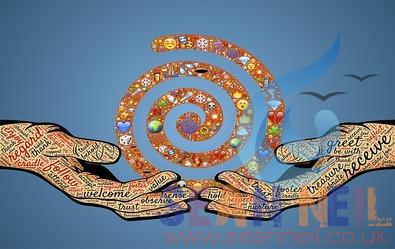We’ve all made mistakes and been affected by the mistakes of others. While some mistakes may be small and easily forgiven, others can cause long-lasting feelings of guilt, hurt, shame, and sadness- leading to stress, anxiety and many other issues.
By practising forgiveness, we can avoid this and live a stress-free life. However, forgiving is not always easy and straightforward. It is a process that requires conscious effort. Forgiving, whether it is self or others, involves acknowledging and accepting the harm caused, as well as having the courage to move forward.
Our healing journey only begins when we are able to forgive those who have wronged us. We know we are healed when we note that the memory of the incident no longer causes us as much pain as it once did.
Forgiveness is often associated with the person who caused us harm, but we often forget to extend it to ourselves. It’s equally important to reflect on our actions and learn to forgive ourselves. Because, regardless of everything, we need to heal too. For this, we must release our feelings of guilt, shame, regret, and embarrassment linked to the situation. We cannot move forward carrying this load all the time. Imagine carrying a heavy backpack filled with stones with each stone representing one of these feelings, how far can we go before we are completely exhausted?
Why is forgiveness important?
Top reasons to self-forgive and unlock self-compassion
Forgiveness helps us to get rid of self-criticism and negative emotions
Self-criticism often leads to self-harm. To stop criticising ourselves, we must first stop the blame. The actions we took in the past were essential for our survival. They may have been our coping mechanisms or survival skills and we believed they were necessary at that time. Let’s acknowledge this and embrace the choices we made, without being too hard on ourselves.
This is the first step towards forgiveness and the first step to reducing our negative emotions like anger, guilt, fear, anxiety, shame, sadness, fear etc.
These negative emotions often express themselves in unhealthy ways, making the situation worse. We must remember these emotions are part of human nature and we cannot simply abandon them. We must accept that it is okay to experience these feelings. We shouldn’t feel bad about it and must forgive ourselves for choosing these forms of expression. When we acknowledge these and forgive ourselves for using these, we will have better control over them.
Forgiveness helps us to accept ourselves fully without judgement
We all have moments where we may not like what we see in the mirror. Maybe it’s a physical feature we don’t like or a personality trait we wish we could change. Often, We are aware that there is very little we can do about it. Yet, we spend an ample amount of time worrying and feeling bad about it.
Forgiving ourselves as a form of acceptance helps us overcome our concerns. We all know that nobody is perfect. When we accept this, we will have more time towards being our best selves, like focusing on things we are good at, rather than criticising ourselves for being imperfect.
When we walk towards the journey of self-forgiveness, we will be less judgemental of ourselves, and ultimately, we will begin to see the better version of everyone around us.
Forgiveness helps us to let go of the past
We all have moments when we may not have done what we should have. Maybe we didn’t speak up for what we believe in or didn’t take action when we should have.
How many times have we said I should have done this, should have said this to ourselves?
Another example, we all have moments where we may not have added value to someone’s life. Maybe we didn’t show up for someone when they needed us or said something hurtful.
In both situations, there is no way for us to go back and correct these. By not forgiving, we are dragging this and the associated negative emotions with us- wherever we go.
We all make mistakes. The best we can do is learn from them and try to be better next time.
Once we acknowledge this, forgiveness becomes easier and the load we are dragging becomes lighter too.
In conclusion, self-forgiveness is crucial to personal growth and healing. It takes courage to forgive ourselves for past mistakes and shortcomings, but it’s necessary to achieve inner peace and self-acceptance. By practising self-forgiveness, we can let go of negative self-judgment and move forward with a renewed sense of self-love and self-compassion.
TLDR
Self-forgiveness: An Essential Ingredient in the Journey of Personal Growth
In a world where perfection is often celebrated, it is becoming increasingly difficult to make peace with our flaws and mistakes.
Self-forgiveness is the practice of extending compassion and understanding and acknowledging our faults and taking them as an opportunity to learn and build a stronger, wiser version of ourselves. This ability helps a person recover from the emotional turmoil that stems from our perceived shortcomings, offering space to heal and move forward.
The primary factors that act as cornerstones of self-forgiveness – are self-reflection and self-compassion. Self-reflection needs an honest overview of our actions, understanding the root of our decisions, and the impact they have on our lives. By self-compassion, we treat ourselves with love and empathy, embracing the realization that imperfection is a natural part of our existence.
By cultivating self-forgiveness, we foster an environment conducive to personal growth and emotional resilience. As we release the chains of guilt, we open doors to new experiences, embracing our vulnerability as a substance for change. For it is in our darkest moments that we find the spark to become better, stronger, and more authentic versions of ourselves. And it is through self-forgiveness that we find the power to unlock our limitless potential.

